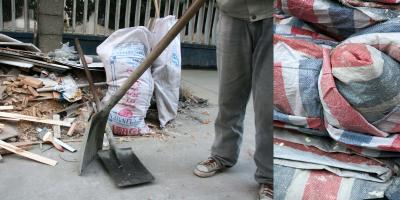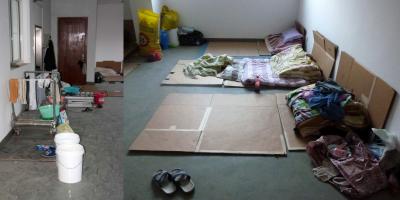Suche
Neu
- MERRY X-MAS (cla_rei, 23.Dec.10)
- SHANGHAI'S YESTERDAY, TODAY AND TOMORROW (cla_rei, 13.Dec.10)
- ON SITE CLOSE UP (cla_rei, 13.Dec.10)
- IN THE SPOTLIGHT FOR ONE MOMENT (cla_rei, 13.Dec.10)
- CONSTRUCTION LOOPS IN SHANGHAI (cla_rei, 13.Dec.10)
Links
Navigation
Meta
Archiv
- November 2010MonTueWedThuFriSatSun12345678910111213141519202122232426272830
RSS
THE HUKOU DILEMMA

As China is turning towards globalization, the issue of the floating workforce is becoming more intense and complex. There are estimated over 130 million migrant workers in China today - people who are leaving their rural home town to find work and a better life in the city. But what do they really find?
A colleague of us wasn’t expecting to find them, when he was looking for a toolset to repair a machine in his company in Minhang, a huge industrial zone south-west of Shanghai. Currently over 17 construction workers are housing in the former craft room during reconstruction work on site. For two months these workers from Shanghai/Pudong are sleeping with thin sleeping bags each on one cardboard on the floor, washing themselves in the toilet-room.
Why nobody cares to provide better housing conditions for the workers? And why are the workers too afraid to claim any of their rights?

One reason why low-skilled migrants are subject to economic and social segregation is the Hukou system, China’s household registration system which identifies each person as a resident of a particular area. Before 1980 this system was inviolate, making it impossible for people to move to seek employment, educational opportunities or better public services. Even food coupons (liangpiao) and hospital treatments were bound to their designated Hukou. After China started its economic reform and open door policy, the government relaxed its restrictions on movement and allowed migrants to move to the cities with temporary residence permits tied to their work contracts. This had a major impact on China’s rapid urbanization as migration was now allowed to take place.
However, the inequality between the citizens with urban status and migrants holding certificates of temporary domicile is dramatic. Migrants are still denied education and medical care outside their Hukou area and the majority doesn’t even have the temporary permission, due to very unstable working conditions and mainly oral contracts.
In the next 5 year program China’s goal is to increase the quality of goods.
But as long as the dilemma of the Hukou system is unsolved, a higher work quality will not be achieved, because it assumes good working conditions.
cla_rei am 29. November 10
|
Permalink
|
0 Kommentare
|
kommentieren